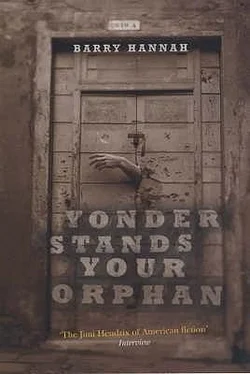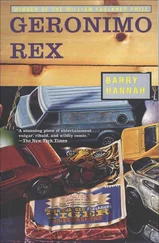“What show could be that good? Good hell, Leon. You got some new bass fool selling his miracle bait? It ain’t even labeled.”
“On purpose. It’s some show. And I hear local talent.”
“Local. You mean an appeal for some poor soul with no liver and no insurance,” said Cecil, whose face got even redder.
“Boys, it’s ‘Teenage Lesbian Comedown.’ That’s why it ain’t labeled. This here is professional stuff. Real slick and Technicolor. Either the law or my old lady caught it on me, wouldn’t be nothing left of my free ass.”
“You mean child pornography?”
“Well. You decide. There’s titties. It’s cultured. Violins. It starts them in big fur coats, mink or Asian-wolflike. You got some fine young nookie here, and it’s like medical art, say. Don’t have no secrets. Then a man come in, like they’s ruler.”
“You’re changing, Leon,” said Robbie. “Aren’t you making living enough?”
“We’re all changing,” said Cecil. “Lots of us ain’t making living enough. Give it here.”
“You gonna buy it?”
“Sure. Who’s the artist? Where do I get my money back if it’s some dog or a fraud?”
“Now, that person has to remain unknown. But you ain’t going to want your money back. Just don’t invite the wife or the kids or the preacher over. This here is bachelor art. Still, one old boy told me he did invite the wife. Said it went just fine. There ain’t no law, state nor federal, says what kind of home you got to have. That’s why the good Lord made venetian blinds.”
They walked out whiskey-righteous, and Robbie started the Jeep Grand Cherokee with officiousness, like a senator entering a filibuster. Then he spoke.
“I don’t know. This place had a purity to it. Low-down but pure. I hate to see him join the common, I guess go modern, you might say.”
“All those poor colorful folks we been watching all our lives and wishing they’d never change, Robbie. We thought they’d just grind it out and be our what, wallpaper. Pretty selfish, us old heads.”
“You got a point there, pal.”
“Nostalgia, shit, me too. I got it every second. Nothing new looks worth a shit to me. New houses seem like goddamn rest stops. We’re dirty old men already, Robbie, face it. And even the dirt don’t seem as tasty as it used to. Now the whiskey’s talking, but I tell you. I’m willing to look at anything’ll change my life before I blow this weary head off.”
“Now, Cecil. Don’t forget a big old she-bass snapping down a top-water plug. About sundown on your flat green water.”
“I never meant there wasn’t still a God, old son.”
“Just wait’ll God’s back in the office. And Cecil, if she could stand this speckled old ass, I’m not averse to teenage love myself.”
They both laughed. A sort of burned laughter.
THIS SUNDAY MORNING MAN MORTIMER AND MAX Raymond sat in the pews of the same church, a little white steepled one in a glen set among live oaks and three acres of clover. The jungle swamps encroached on and squared the glen, deep green to black. Loud birds and alligators groaning in their mating season roamed in songs from bayou to bayou. Some fish walked on land in this season.
Cars, just a few of them, sat on the pea gravel under the trees just outside the windows of ersatz stained glass colored like the wreckage of a kaleidoscope. Mortimer and Raymond knew each other then only by automobile. Mortimer favored a rotation of expensive foreign sport utility vehicles. Raymond drove the same old Lexus he had bought when he was a physician.
Raymond came to worship, and to repent, and he wanted a vision. Life heretofore had not instructed him. He had won his wife, a raven-curled, writhing singer of Latin jazz, in a ghastly way that wrecked him as a doctor. He was a dread-stuffed saxophonist in her band. Afraid of his own irony, his insincerity, his ambiguity. Now Raymond had come to repent. He loved Christ, but he yearned for a solid thing to witness, a vision undisputed, because his faith was by no means confirmed.
Man Mortimer was slightly drunk, a state unusual if not unprecedented for this quiet man, a gambler, a liaison for stolen cars and a runner of whores, including three Vicksburg housewives. He was small but substantial, with a big head of waved hair and hooded bedroom eyes. In high school he was a dead ringer for Fabian but in recent years was verging toward the dead country star Conway Twitty. At forty-five he still retained his looks, and the women he sold kept a crush on him and liked his stares, which seemed to invite them into a dangerous ring of power. His charisma assured the women their lives were broad, deep and special, and that half the money in their adventures around the boudoirs of this poor county and in the lacier rooms of Vicksburg belonged to him. The law could not touch him because his bordello was spread in myriad chambers throughout the suburbs and even underpasses in giant, newish sport utility vehicles with flattened rear seats, good mattresses, sunroofs tinted by creamy smoke and fine stereo systems, the aphrodisiacs of new-car smell and White Diamond mist working side by side. These perfumes and compact discs were chosen by Edie, a gal Friday of his who otherwise worked as a blackjack dealer in the casino. His books on the car business were excellent, prepared by an accounting genius named Large Lloyd for his build and his hang, an ex-wrestler and permanent bouncer whose pride in his math and tax savvy was so wild it intimidated the auditors who had once looked into the business. Lloyd was a casino employee, chauffeur and gigolo. Man Mortimer owned three homes, and he gave parties, or mass appointments. He made a point of being nothing like Hugh Hefner, whom he despised for his philosophy and aesthetic pretensions. At Mortimer’s parties there were no drugs, no guns, no liquor more than social.
The casino in Vicksburg was clean, even elegant, for these fly-specked counties, but its exits were full of ruined persons, many of them women. Edie and Large Lloyd could spot them and cheer them. Mortimer would appear in an exquisite sedan, as if happening in to end the night after some happy day with well-heeled Episcopals, and steer the women to their salvation. He knew the faces and the postures, and he never made the mistake of plying a busted gambler who was pious or gowned in unpurchasable pride. He couldn’t afford noisemakers. On the other hand, he could take another kind of woman right off the arm of her escort, who was likely to be broke and puny too. For a man in such despair and trouble, the exit of his consort might seem merely another cloud in a black evening.
Mortimer had come to the church service in a spell of nostalgic spite. He wanted to see if the preachers were still as feeble and funny as they used to be when he was a kid.
The preacher was Egan, a reformed biker, gambler and drug addict, still with a ponytail, brown-gray, and a large black Maltese cross tattooed on his right cheek. A man immoderate in both callings, dissolute and sacred. He was preaching against the casino now, this nearby hell, a factory of thievery and broken hearts. He preached about hollow and slick men and slot-machine hags with no souls. The leering zombies schooled to rob the poor and sad in the name of fun. Worse than the liquor were the glamour and baying of Mammonites, who turned the soul into nothing but the arithmetic of want. His voice boomed out like Johnny Cash.
Then at the pulpit he tied off his arm with his necktie and injected a hypodermic into a great vein and plunged holy water into it, then withdrew the plunger, and they saw the pale blood in it. This is what God gave us, not the green, gray dirty thing we call cash. Filthy lucre. Filthy, how the old scribe knew it . Mortimer had to agree the man was good. A woman near him fainted and hit her head on the pew. None moved to comfort her, not her children, not her paramour in common-law union. Mortimer almost did, spying a piece of business, before he stopped himself.
Читать дальше











